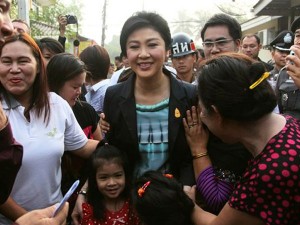Polls open in tense Thai national election

Thai Prime Minister Yingluck Shinawatra arrives to cast her ballot for the general election at a polling station in Bangkok, Thailand, Sunday, Feb. 2, 2014. AP.
BANGKOK, Thailand—Thailand’s tense national election got underway Sunday with protesters forcing the closure of several polling stations in the capital amid fears of more bloodshed a day after gun battles in Bangkok left seven people wounded.
The extent of disruptions was not immediately clear when polls opened nationwide. But there were early indications that several hundred polling stations in Bangkok and southern Thailand, an opposition stronghold, could not open because protesters had blocked the delivery of ballots or stopped voters from entering.
Whatever happens, the outcome will almost certainly be inconclusive. Because protesters blocked candidate registration in some districts, parliament will not have enough members to convene. That means beleaguered Prime Minister Yingluck Shinawatra will be unable to form a government or even pass a budget, and Thailand will be stuck in political limbo for months as by-elections are run in constituencies that were unable to vote.
The risk of Election Day violence remained high a day after seven people were wounded during an hour-long gun fight that broke out in broad daylight at a busy Bangkok intersection Saturday between government supporters and protesters intent on derailing the polls. Among the injured was reporter for the local Daily News newspaper and American photojournalist, James Nachtwey, who was grazed by a bullet in the leg.
The exchange of fire was the latest flare-up in a months-long campaign by protesters to overthrow Yingluck’s government, which they accuse of corruption. The violence crystallized the power struggle that has devolved into a battle of wills between the government and protesters—and those caught between who insist on their right to vote.
Under heavy police security, Yingluck cast her vote at a polling station in northeastern Bangkok, cheered on by supporters.
“Today is an important day,” Yingluck told reporters. “I would like to invite Thai people to come out and vote to uphold democracy.”
Voting was not as easy in other parts of Bangkok, where protesters vowed to fill the streets to prevent voters from reaching polling stations.
At one of the more volatile districts of central Bangkok, a group of would-be voters in Din Daeng tried and failed to push through a crowd of protesters.
“This is too much. I want to vote,” said 42-year-old Yupin Pintong, a Bangkok resident. “I don’t care if there’s violence. I will be really upset if I don’t get to vote.”
The conflict pits demonstrators who say they want to suspend the country’s fragile democracy to institute anti-corruption reforms against Yingluck’s supporters who know the election will not solve the nation’s crisis but insist the right to vote should not be taken away.
The protesters, a minority that cannot win power at the polls, are demanding the government be replaced by an unelected council that would rewrite political and electoral laws to combat deep-seated problems of corruption and money politics. Yingluck has refused to step down, arguing she is open to reform and that such a council would be unconstitutional.
Since protests began late last year, at least 10 people have been killed and nearly 600 wounded.
The political standoff in the streets meant the campaign, at least in the capital, was done without the usual billboards, posters and sound trucks, with the pre-election buzz focused on violence instead of policies.
“How did we get to this point?” asked Chanida Pakdeebanchasak, a 28-year-old Bangkok resident who was determined to cast her ballot Sunday no matter what happens.
Although unrest has already hit Bangkok and polling stations were not expected to open in some parts of the south, voting was expected to proceed smoothly in most of the country.
Police said they will deploy 100,000 officers nationwide, while the army is putting 5,000 soldiers into Bangkok to boost security. More than 47 million people are registered to vote.
A power vacuum may entice the military to step in and declare a coup as it did in 2006, when Yingluck’s elder brother, ex-premier Thaksin Shinawatra, was deposed. Thaksin lives in exile but has remained a central—and highly polarizing—figure in Thailand’s political strife ever since. The rural majority in the north adore him for his populist policies, such as virtually free health care, while Bangkok’s elite and many in the south consider him and his family a corrupting influence on the country. Protesters say Yingluck is a puppet of her billionaire brother.
Another possibility is what is being called a “judicial coup.” Analysts say the courts and the country’s independent oversight agencies all tilt heavily against the Shinawatras’ political machine, and Yingluck’s opponents are already studying legal justifications to nullify Sunday’s vote.
RELATED STORIES
Bangkok tense on Thai election eve
Thailand to proceed with trouble election














